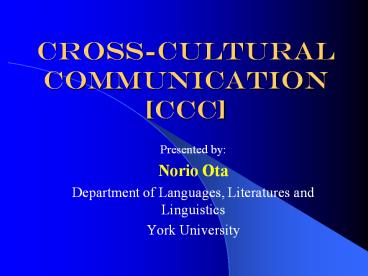Cross-Cultural Communication [CCC] - PowerPoint PPT Presentation
Title:
Cross-Cultural Communication [CCC]
Description:
Cross-Cultural Communication [CCC] Presented by: Norio Ota Department of Languages, Literatures and Linguistics York University – PowerPoint PPT presentation
Number of Views:306
Avg rating:3.0/5.0
Title: Cross-Cultural Communication [CCC]
1
Cross-Cultural CommunicationCCC
- Presented by
- Norio Ota
- Department of Languages, Literatures and
Linguistics - York University
2
Prologue recent events
- US submarine and sunk Ehime-maru
- U.S. spy plane and downed Chinese jet fighter
- Japan China - demanding apologies
- Offering apologies - common courtesy
- Sorry for what happened.
- Offering apologies - admitting guilt and
responsibility U.S.
3
CCC Exercises
- Bowing with greetings
- Counting numbers with hands
- Eye-contact
- Chiming-in
- Negative questions and Yes and No
- Other nonverbal communication
4
What is Cross-Cultural Communication?
- Communication is CCC.
- CCC is Discipline.
- CCC is Action.
- CCC is Practice.
- Networking.
- Globalization.
- Sustainability.
- Multi-culturalism.
5
Communication is CCC.
- CCC bridges gaps between sub-cultures.
- Every institution has its own sub-culture.
- Family, marriage, friendship, school
- Cross-gender
- Cross-generation
- Cross-occupation
- Cross-position
- University Students, Staff, Faculty, Techies,
Administrators
6
CCC is Discipline.
- CCC is an interdisciplinary discipline.
- CCC cuts across human activities.
- CCC sheds light on unnoticed aspects.
- CCC can explain why and how people behave.
- CCC is applicable to other cultural and
sub-cultural situations.
7
CCC is Action.
- CCC is not a theory, but an action.
- CCC requires knowledge, training and application.
- CCC enhances cross-cultural communicative
competence. - CCC improves 1st and 2nd language communicative
ability. - Nonverbal communication
8
CCC is Practice.
- Networking
- Globalization
- Sustainability
- Multi-culturalism
- Anti-racism
- World peace
9
CCC is Networking.
- CCC helps to network horizontally and vertically.
- CCC becomes foundation for communication network.
- Network is evolutionary.
- CCC breaks through isolationism.
- CCC reduces racism.
10
CCC is Globalization.
- CCC prepares people to manage and survive in new
environment. - CCC creates people who share similar values.
- CCC appreciates both similarities and
differences. - CCC is instrumental to world peace.
11
CCC is Sustainability.
- CCC enhances knowledge and understanding other
cultures. - CCC appreciates diversities and different values.
- CCC creates sustainable environment for
individual cultures. - CCC fights against marginalization in
globalization.
12
CCC is Multi-culturalism.
- CCC promotes multi-culturalism and anti-racism.
- CCC enhances cross-racial understanding,
knowledge and communication. - CCC has niche in Canada because of its diversity
and policies. - CCC makes Mosaic possible.
13
Contrastive Approach
- Key notions to describe Japanese culture, society
and psyche - Japanese vs. English
- Video
- Giving and Receiving Favors
- Education
14
Japanese vs. EnglishCognitive/Discourse/Textual
- Japanese
- holistic
- general
- descriptive
- situational
- context-dependent
- elliptical
- English
- analytic
- specific
- explanatory
- less situational
- context-independent
- exhaustive redundant
15
Japanese vs. EnglishSociolinguistic/Pragmatic
- Japanese
- formal
- indirect indecisive
- rank-conscious
- submissive
- concessive
- agreeable understanding
- appreciative
- apologetic
- modest reserved
- responsive
- less exclamatory
- less derogative
- less rewarding
- English
- informal
- direct decisive
- egalitarian
- independent
- self-determined
- competitive challenging,provocative
- less appreciative
- self-righteous
- boastful proud
- less responsive
- exclamatory exaggerative
- derogative
- rewarding
16
Japanese vs. EnglishPsycholinguistic
- Japanese
- Introversive inconspicuous
- collective
- subjective intuitive
- emotional sentimental
- pessimistic negative
- retrospective
- English
- extroversive conspicuous
- individualistic
- objective logical
- rational
- optimistic positive
- prospective
17
Case Studies
- Rules of Conversation
- Monologue vs. Dialogue
- Accountability
- Accountability vs. Responsibility
- Informed Consent
- Negotiation
- Genuine concerns
- Achievement
- Majority support
- Compromise
18
Epilogue
- CCC starts right at home.
- Speaking the same language with different
subcultures - Effort in finding out about others
- How far do you go?
- Beyond cultural relativism
- Establishing inclusive but critical and selective
common criteria
19
References
- Benedict, Ruth (1946) The Chrysanthemum and the
Sword Patterns of Japanese Culture, Boston. - Christopher, Robert (1984) Japanese Mind, Pan.
- Hall, Edward T. Mildred Reed Hall (1987) Hidden
Differences Doing Business with the Japanese, - New York Anchor Press.
- Nakane, Chie (1970) Japanese Society, Penguin.
- Sakamoto, Nancy Naotsuka, Reiko (1982) Polite
Fictions Why Japanese and Americans seem rude - to each other, Tokyo Kinseido.
20
Contact
- Norio Ota
- Coordinator, Japanese Computing
- Department of Languages, Literatures and
Linguistics - York University
- Phone (416)736-5016 x88750
- Fax (416)736-5483
- E-mail nota_at_yorku.ca
- Web http//buna.yorku.ca/































